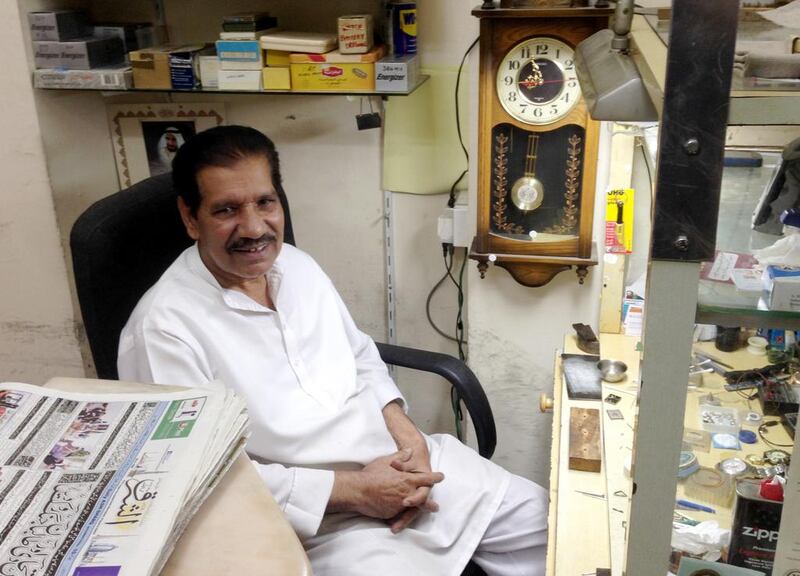Maqsood Ahmed sits hunched over his workbench, eyeglass fixed to one eye as he examines the delicate movement of a mechanical watch. Inside is a complex web of springs, screws and wheels. The repair job is painstaking: the seconds, minutes and hours tick by before the job is done. But Ahmed is a man with time on his hands.
Dozens of tiny screwdrivers, magnifying glasses, boxes of watch straps, hundreds of different types of batteries and a dizzying assortment of watch parts are carefully ordered around the shop. On the walls are clocks he has repaired. “Any watch you have, I will repair. Customers will bring very, very old watches. This is my hobby. I have experience; I’m a long time at this,” he says.
Ahmed’s shop is located in an older part of Abu Dhabi’s Al Zahiyah neighbourhood, formerly known as the Tourist Club. The area is one of low-rise residential buildings and has a significant Ethiopian flavour – the shop sits incongruously among ethnic food outlets, traditional cafes playing Ethio jazz, and the more widely known Bonne Annee restaurant. During the day, the streets are quiet but by dusk, men play boardgames on the pavement, shop owners drink tea outside their shops and children play football on the side streets.
Ahmed can get up to 10 customers a day. To replace a watch strap he charges Dh20 to Dh30, while a simple job such as a new battery starts from Dh20. He takes out a silver Rolex from a drawer. “It’s owned by an old Emirati; the watch is 60 years old. I charge just Dh150 to replace the glass, like new, but the dealers in the mall will charge you much more of course.”
Ahmed leans under the counter and from an old, yellowing envelope takes a silver Sekonda stopwatch. “This is Russian-made and used for sports like football but the central balance is no longer working. This will take three to four hours to fix. I don’t use machines. All by hand.” Despite the hours involved, Ahmed will charge just Dh100 to fix this.
At the front of the shop stands a grandfather-style clock. German-made, the chimes no longer work. He opens its side door and examines the intricate system of levers, cogs and pendulums: “This will take weeks to fix as it is a weight system – the same as Big Ben. This will cost maybe Dh2,000 to Dh3,000 to fix. It’s very complicated.”
Ahmed, 70, came to the UAE from Lahore, Pakistan, in 1979 in search of a better life. His brother was an engineer in the oil sector here. Before this he worked in a souq in Lahore fixing watches. Ahmed recalls his apprenticeship in the city from 1961 to 1966 as being particularly tough. “Teacher said: ‘Stand here – what I do, you see.’ This was my training. It was too much work then in Lahore – without money, without anything. I slept in the training centre.”
In 1981, he moved to Abu Dhabi and began repairing watches. His current shop is his third in the same area, as he had to move once because a building was demolished.
Times were good in the city in the 1980s. “There were no signals on the roads, only roundabouts. And only two or three cars outside the buildings. The city was not like today. Buildings were not big. You now see 100 floors. Business was good, everything good. But then: changes, changes,” he says.
As Ahmed recalls gentler times, a customer walks in. He needs a new strap. Ahmed takes out a box and carefully measures each one against the watch. The customer, a Syrian, tells me he heard about this place by word of mouth in another nearby shop. “Yeah, I’ve been here a few times. The agency shops are very expensive and they always say: ‘I need to keep it for one week, or send it away for parts or send somewhere for repair, etc, etc’. This way is better.”
The man leaves and the watch repairman sits back at his workbench in silence. But time doesn’t stand still, even for Ahmed. Footfall has decreased and changing tastes mean that there are less and less young people coming to his shop.
“No. Business is no good. The area is not good. Madinat Zayed and Khalidiyah are better. But rent is too much there, Dh80,000, Dh90,000, Dh100,000. All the buildings are new and all the people go there. Other places cost too much to rent. That’s why I stay here. The new generation doesn’t really care about this. They just want the battery or strap and then go. They don’t care about where the parts come from. They want it all immediately.
“I’ll work for as long as possible. It’s really just a hobby for me now. I love this.”
Ahmed picks up a gold ladies’ watch that needs a new part. The only sounds in the shop now are the gentle tick of the clocks and watches.
John Dennehy is deputy editor of The Review.






